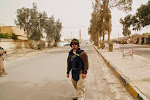






John and I had the opportunity to attend a meeting between some of the local sheiks (tribal leaders who are respected mediators within their locale) and local USMC officers to review some issues within their areas of concern. These meetings are key to the social and local political relationships within Arab life, and must be cultivated over time. In order to both maintain and cultivate these relationships, it is necessary that quality social time is spent with these leaders, while listening and addressing their concerns and those of their tribe. These meetings require proper local social skills, and the hospitality of the hosts (and correct and gracious responses by the guests) is closely scrutinized. (FYI - Never show the sole of your foot to an Arab, and always accept/eat/return food and drink with your right hand. The sole of the foot and the left hand are considered unclean.)
Tribal relationships are a key factor within most of the social, geographical, and (therefore) political aspects of most of the communities within Iraq. These tribes are extremely close knit (and have long collective memories - a reason for some of the inter/intra-tribal revenge-violence that has occurred), but some "blurring" occurs between tribal boundaries due to inter-marriages that may occur to help foster relationships between neighboring tribes. Sheiks are men who command great respect within their tribal (neighborhood) communities (but have often been the target of repeated assassination attempts because of their relationship with US forces), so I have obscured their identities for their security.
Arab society is built upon hospitality (much like the Southern U.S. where I have spent most of my life.) You are warmly welcomed upon your arrival, enthusiastically greeted, and quickly seated. The sheik host sits at the "head" of the room, and the guests' social standing (within the context of the meeting and other guests) is determined by your proximity to the Sheik. It is considered good manners to remove your footwear when you enter an Arab abode (although we did not do so, because the Iraqis understand that the US military does not follow this custom for a variety of reasons - security being an important factor.) Guests are quickly seated upon floor cushions, with other cushions to recline upon. We were careful to either place our feet upon the floor, or sit cross-legged to avoid displaying the soles of our feet to our guests.
Once seated, we were formally welcomed by the sheik and his brother, and introductions were made. After a few minutes of polite conversation, young men brought small crystal "shot" glasses of chai (hot tea) with a triple helping of sugar undissolved in the bottom of the glass. These cups of chai were served upon a china tea saucer with a small silver spoon with which to stir the chai and sugar. Several rounds of chai were served before a pitcher of espresso and one china cup were brought out. A shot of espresso was poured for each guest, starting farthest away from the Sheik. The guests would quickly drink the espresso, before the empty cup was refilled and passed to the next guest. This rotation of hot chai and espresso continued throughout the discussions for the next two hours (often interspersed with ice cold bottled water, poured into individual glasses set before each of us.)
Finally, once the "business" discussions were concluded, a vinyl floor covering was spread over the beautiful carpet and two huge platters of food were brought in and set upon the floor. Everyone scooted up, off the floor cushions, and (with their right hands) began scooping up the delicious rice, vegetables, roasted lamb and chicken, depositing each handful as carefully as possible in our mouths. Finesse was required, as we had no plates or napkins, and certainly did not want to spill food on our host's beautiful carpet. The food was absolutely delicious, and we all ate until we were stuffed. Once we were through, the guests seated further away from the Sheik moved up to take our places.
After everyone had eaten, we began our farewells, exchanging business cards, and taking a few photographs to be shared later. John and I felt very welcome, and I have since received several emails from the Sheik encouraging me to return again soon.


